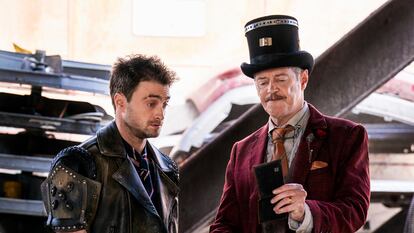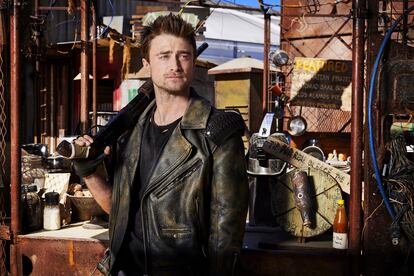‘Miracle Workers,’ a roguish tribute to God’s helpers
The low-profile but hilarious TV series featuring Daniel Radcliffe and Steve Buscemi provides a modern-day lesson on exploited workers everywhere

The premise couldn’t be more appealing. You work up there in Heaven with God (Steve Buscemi), who is a lanky, ordinary-looking guy. You hold a unique and seemingly superfluous job: answering prayers and performing miracles that are often quite trivial. Prayers to avoid arriving late and not getting locked out of the house. But the workload is crushing — the stream of petty prayers to answer never ends. So, you begin to wonder about your own competence, believing that there may be room for performance improvement. In truth, your work is infinite — it will never be finished. Does this resonate? Miracle Workers, an anthology comedy television series that first aired on in 2019, finished up its fourth season last August with a blistering look of life on Earth in the 21st century.
The ethereal realm of the Great Beyond portrayed in the exceptional debut season reflects the absurd and deranged state of contemporary overproduction. In this Heaven, miracles are incessantly cranked out, yet devoid of any purpose. A sole overworked angel distributes them haphazardly, while the world hurtles towards its inevitable demise. God, fatigued from endless toil (which, truth be told, brings him profound delight), has forgotten why he created this impractical, over-busy planet and intends to obliterate it. What should our protagonist, a low-level angel played by Daniel Radcliffe, do? How can any worker confront an incompetent boss who wields absolute power?

Miracle Workers is based on a novel and short stories by the always entertaining Pixar screenwriter Simon Rich. Each season presents a hilarious diatribe against the world, with the same actors playing different roles in various times and places. Unfortunately, the focus on miracles is limited to the first season. The Middle Ages are the setting of the second season; the Far West in the third; and a dystopian future in the fourth. In all these worlds, hardworking and unappreciated people labor in obscurity.
The brilliance of the initial premise resonates throughout the subsequent seasons, with the second season being possibly the weakest. The series revolves around an intriguing concept: a covered-wagon journey west to Oregon. This deconstructs the quintessentially American Western genre while simultaneously envisioning an unimaginable future. The final season is particularly intriguing, as it blends John Cheever-style suburban life with the dystopian world of Mad Max. Imagine having dinner with your boss and your spouse, who happens to be a murderous housewife wearing the uniform of a dead train conductor. In both the present and future, no one seems to be in control, yet one aspect remains constant. Those who do their work diligently and enthusiastically are always the losers, victims of their own boundless naiveté.
Sign up for our weekly newsletter to get more English-language news coverage from EL PAÍS USA Edition
Tu suscripción se está usando en otro dispositivo
¿Quieres añadir otro usuario a tu suscripción?
Si continúas leyendo en este dispositivo, no se podrá leer en el otro.
FlechaTu suscripción se está usando en otro dispositivo y solo puedes acceder a EL PAÍS desde un dispositivo a la vez.
Si quieres compartir tu cuenta, cambia tu suscripción a la modalidad Premium, así podrás añadir otro usuario. Cada uno accederá con su propia cuenta de email, lo que os permitirá personalizar vuestra experiencia en EL PAÍS.
¿Tienes una suscripción de empresa? Accede aquí para contratar más cuentas.
En el caso de no saber quién está usando tu cuenta, te recomendamos cambiar tu contraseña aquí.
Si decides continuar compartiendo tu cuenta, este mensaje se mostrará en tu dispositivo y en el de la otra persona que está usando tu cuenta de forma indefinida, afectando a tu experiencia de lectura. Puedes consultar aquí los términos y condiciones de la suscripción digital.









































